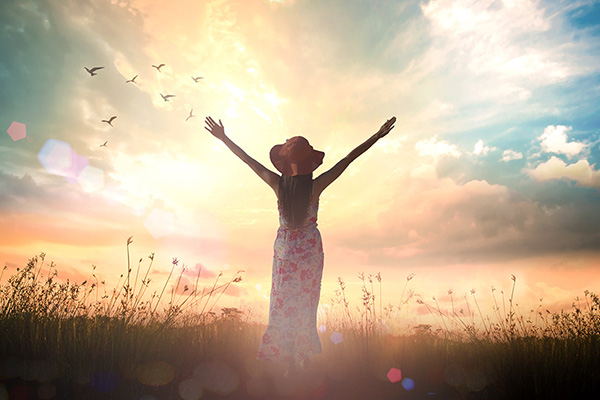self-mastery
Facing Our Shame Leads To Spiritual Growth
 I was recently reminded of a hasty set of predictions I made a decade ago for a former colleague, when I had just started my psychic career. At the time, his wife was pregnant with twins, and I foolishly attempted to forecast when, where and how they would be born. Some of my predictions panned out, while some didn’t. At least I correctly predicted they would be born under the sign of Leo!
I was recently reminded of a hasty set of predictions I made a decade ago for a former colleague, when I had just started my psychic career. At the time, his wife was pregnant with twins, and I foolishly attempted to forecast when, where and how they would be born. Some of my predictions panned out, while some didn’t. At least I correctly predicted they would be born under the sign of Leo!
Looking back on it, I realize I was overly giddy in wanting to share my impressions with him. I certainly overstepped boundaries as a developing psychic, when I chose to impulsively send my predictions to him by email, without him asking for it. This kind of unsolicited psychic advice is seldom a good idea.
In those early days, I wrongly assumed it was the right thing for me to do. I presumed it my duty as a psychic to share whatever I perceived. Not only did I later regret sending that unwelcome email, but I also felt very embarrassed and ashamed. It also shook my fragile ego at the time.
Today, I see it very differently. That hasty email has since served as a valuable lesson in humility, patience, and vulnerability. In fact, it made me a better psychic. These days, I am much more measured and circumspect in my approach, and I no longer feel pressured to share absolutely everything that comes to mind, especially not if it is uninvited.
We all make foolish mistakes sometimes, but we live and learn. This is, after all, what our life journey as a spiritual being in human form is all about. Sometimes my clients say things like, “I shouldn’t have said that,” or “I wish I had never done that.” I then gently remind them there’s never a black-and-white line in the sand that, once you have crossed it, you’ve forever made yourself a ‘loser’ or a ‘fool.’
Learning To Forgive
 Accepting, letting go and forgiving is difficult, but necessary to thrive and live our best life. When we do not forgive, we carry toxic energy within that poisons us mind, body and soul.
Accepting, letting go and forgiving is difficult, but necessary to thrive and live our best life. When we do not forgive, we carry toxic energy within that poisons us mind, body and soul.
Energetically non-forgiveness wreaks havoc in our chakras that can cause physical disease and mental illness. Our chakras store the energies of negative life events and experiences, if we do not release it, and heal those imbalances and blockages.
Forgiving does not mean we condone or exonerate the evil deeds of others, nor do we have to allow the people who have wronged us back into our life. This is seldom wise.
However, it is also not karmically smart to harbor resentment, seek vengeance, or wish others harm…for it will come back to us. Forgiveness is to surrender control and allowing karma to deal with those who wronged us.
When we forgive and release the trauma others have caused us, their choices and actions can no longer control us, nor steal our happiness, joy, and well-being. This is why forgiveness is the best gift we can give to ourselves.
Forgiveness does not set the wrongdoer free or exempt them from their karmic debt. Instead, we set ourselves free, so that their karmic choices no longer interfere with our energetic well-being and our divine right to manifest our best life. When we do not forgive and move on, it will continue to haunt us. It gradually infiltrates and contaminates every aspect of our life, and even causes us to attract more of the same unwanted experiences.
We Choose Our Way Of Being In The World
 Our material belongings reveal much about how we tend to operate in this world. For example, I can look at the make of a person’s vehicle, as well as the model, size, and color, and instantly get a sense of how they navigate through life. I further believe we also choose our way of being in this world, based on our spiritual mindset.
Our material belongings reveal much about how we tend to operate in this world. For example, I can look at the make of a person’s vehicle, as well as the model, size, and color, and instantly get a sense of how they navigate through life. I further believe we also choose our way of being in this world, based on our spiritual mindset.
A good friend and I own the same make of car, but different models. Mine happens to be a smart car and hers is a jeep. This makes perfect sense to me in terms of our personalities and lifestyle.
I am small in stature, so it is only logical that my preferred vehicle would also be small, snug and space efficient. She, on the other hand, frequently has to transport passengers, as well as plants, clothes and a variety of household items that belong to the members of her family.
More interestingly, however, is that both of us have experienced the exact same technical problem with our cars. There was a time when both our cars suddenly indicated that the brake lights were no longer functioning.
When that little warning light came on in my car, I immeditately sensed the worst, but I secretly hoped that only the bulbs might need to be changed. To my shock and horror, the entire panel eventually had to be replaced. The day I took the car in to be fixed, I miraculously escaped a major traffic accident on my usual route at my usual travel time, because my car happened to be in the shop. Yes, sometimes a malfunctioning brake light can in fact save your life!
Judgment Limits Your Soul Growth
 So, let’s try a different attitude just for today – just so we can experience what it’s like to exist on a higher spiritual frequency and how good it feels to be connected to God, Source, Spirit, Higher Intelligence, the Divine.
So, let’s try a different attitude just for today – just so we can experience what it’s like to exist on a higher spiritual frequency and how good it feels to be connected to God, Source, Spirit, Higher Intelligence, the Divine.
To help bring yourself into spiritual alignment and to be a healthier, happier human being, mentally, psychically and spiritually, simply let go of analyzing and evaluating others. The only reason we do this is usually because we are trying to cover up the misalignments in our own life.
When we constantly criticize and judge ourselves and others, we are essentially keeping ourselves trapped in a life on low, shallow energy altitudes. Hence we hinder our soul from achieving wonderful growth.
Some of the unhealthiest, most miserable people I know tend to always judge. They constantly feel the need to analyze and pass judgment on others, and what is worse they often judge themselves much more severely! I mean, if you can’t see it in their aura, you can definitely see it in their face. The eyes are indeed the windows to the soul.
When we have sincere faith in a higher power we simply do not feel the need to constantly judge ourselves and others. When we judge others we only hurt and limit ourselves. Judgment, intolerance and fear hinder our soul growth. So, just for today try a less judgmental attitude. You just might like it! You may even find it’s better to live this way every single day for the rest of your lifetime.
Life is simply too short and precious to spend it indulging in so much judgment and negativity. So, stop blocking yourself from being the best version of you. Do not analyze and evaluate yourself and leave others in peace to deal with their own karma.
Be The Change You Wish To See In The World
 Our co-created world has always been full of woes and challenges. To ignore these difficulties is irresponsible, but to focus obsessively on it creates more of the same. So, how can we possibly affect real, meaningful change in the world as mere individuals?
Our co-created world has always been full of woes and challenges. To ignore these difficulties is irresponsible, but to focus obsessively on it creates more of the same. So, how can we possibly affect real, meaningful change in the world as mere individuals?
The answer is simple: we must take personal responsibility for the choices we make, and be intentional about how we are living. In other words, we must begin with ourselves, instead of trying to change everyone else and the world around us.
Our power to make change in the world comes down to taking responsibility for that which we do have control over – ourselves. Change begins in our own backyard.
Rather than pointing out how others might improve, we should focus on what is within our own power to improve. It doesn’t matter how small these changes may be. Once we make a start to improve aspects of our own life, it becomes like a domino effect.
Making improvements in your own world, whether it be cleaning up that pile of junk that’s been cluttering up your home, or dealing with internal ‘junk’ that no longer serves you, will improve your own existence and experience. In turn, simply by doing this for yourself, you may find you inspire others to do the same.
At the very least it will help to improve your own energetic flow and raise your own vibration. You can then take this positive new vibration with you everywhere you go, and it will influence and bless every interaction you have with others.
Old Baggage Is Not A Badge of Honor
 I have successfully worked with many clients over the years who finally found me after they chose to hang onto anger, resentment, bitterness, or self-pity for many years, even decades, to their own detriment. Withe guidance of spirit, I have also helped many people find peace and healing, after they had pushed away everyone in their life away by continuously abusing the patience, compassion and generous support of their friends and family, by burdening them with same, sad story or repetitive dysfunctional behaviors, over and over again.
I have successfully worked with many clients over the years who finally found me after they chose to hang onto anger, resentment, bitterness, or self-pity for many years, even decades, to their own detriment. Withe guidance of spirit, I have also helped many people find peace and healing, after they had pushed away everyone in their life away by continuously abusing the patience, compassion and generous support of their friends and family, by burdening them with same, sad story or repetitive dysfunctional behaviors, over and over again.
I have also witnessed the amazing personal growth and miraculous healing of those who were able to let go of the anger and hurts. And I have watched many thrive once they realize that their self-worth and personal power begin outside the comfort zone of their long-standing victim mentality.
I asked spirit for a message today to share with those that are stuck in this way and not moving forward in life. This is what I was given.
Do not dwell upon your pain, do not try to make yourself a martyr in suffering. Stop allowing the things that have hurt you to control where you are in the here and now.
It is time to boldly step up, stand your ground, and say, “I love myself and I am not going to let the past control my life any longer. I am stronger than all that has happened to me. And yes, it hurt me in the moment, but I refuse to drag it with me any longer further, because it prevents me from moving in the direction of my highest good. It poisons my well-being and steals my happiness, and I refuse to allow it any longer.”
Choose Your Words Wisely
 Did you ever stop to think about the sounds that come out of our mouths? We use them to form phrases and sentences. It is how we communicate. But, have you ever considered the true nature of these sounds, or the power contained within our words, the power of the vibration?
Did you ever stop to think about the sounds that come out of our mouths? We use them to form phrases and sentences. It is how we communicate. But, have you ever considered the true nature of these sounds, or the power contained within our words, the power of the vibration?
Words are formed using the organs of speech that creates a vibration, thus causing a sound. We know that sound doesn’t just disappear. Sound travels – from our mouths, past the person it is directed to, past a few others, and on and on, into the ethers.
Words are more powerful than we realize. Maybe we should choose our words more wisely. If we send negative words out, whether we sincerely mean it or not, it never goes away. That negative vibration we sent out has an effect on the earth, the solar system and the universe. It may even come back and have an effect on you, without you ever even realizing it.
Historically soldiers have always marched as an army in one way or the other. It made me wonder why they march in sync and to a set rhythm, like they do. Because, it looks cool? No, they march in unison and uniformly, because their foot stomping causes a vibration. If the vibration matches the frequency of a target, it becomes a powerful weapon.
The Walls of Jericho is a good example. The Israelites wandered the desert for 40 years. Upon arriving at Jericho, they marched around the city for six days. On the seventh day they circled the city seven times. The priests then blew their trumpets and they shouted and the walls of the city fell down. Just another bible story? Well, we know vibration can bring down bridges and maybe those priests knew the note to play that gave a specific vibration that brought those walls down.